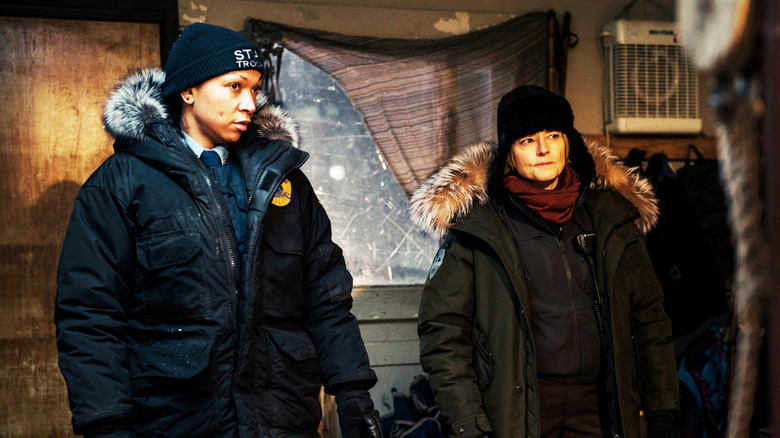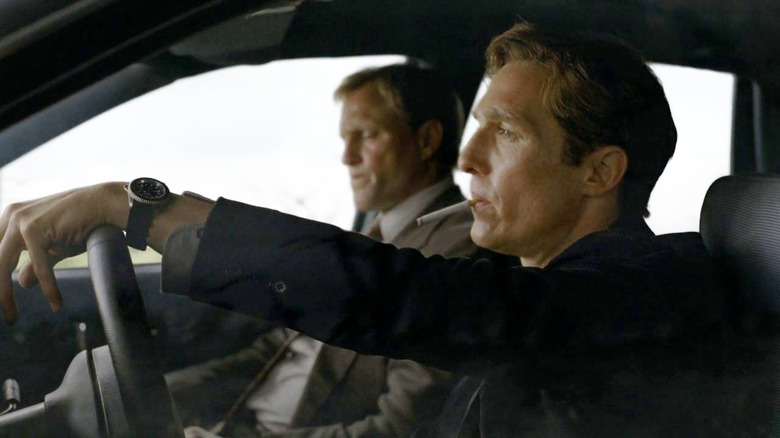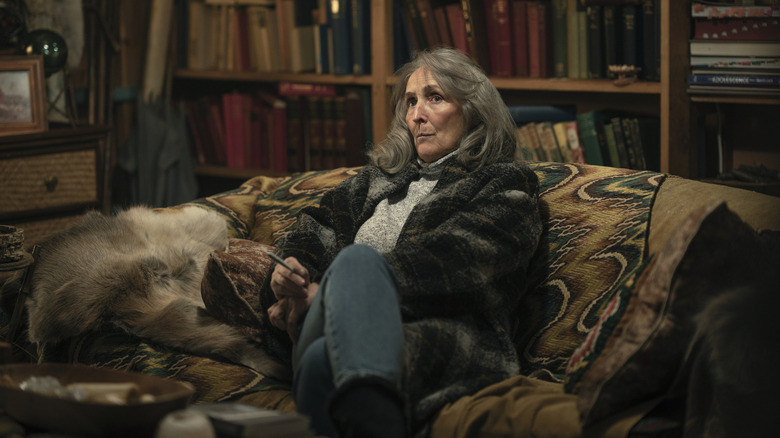True Detective: Night Country Might Have Revealed The Origin Of Rust Cohle's Philosophy
This article contains spoilers for the latest episode of "True Detective: Night Country."
Showrunner Issa López had multiple sources of inspiration for "True Detective: Night Country." If you haven't clocked some of the more obvious ones by now, they include John Carpenter's Arctic horror classic "The Thing," "The Silence of the Lambs" (which gave López the idea to cast Jodie Foster as police chief Liz Danvers), and David Fincher's "Seven," from which the new showrunner borrowed one particularly disturbing moment.
On top of those major touchstones, López clearly drew from her own experiences. The Mexico City native grew up with a Catholic, somewhat superstitious mother and a communist atheist father. Which, if you haven't noticed by now, is a contradiction that finds expression in how "Night Country" walks a tightrope between gritty realism and supernatural mystery.
But there's also another big influence on the new season of "True Detective": the first season. It might be tiring to constantly compare "Night Country" to creator Nic Pizzolatto's original run of episodes, but there's simply no escaping the fact that López has sprinkled more than a few references to those episodes throughout her vision for the series. It started with the spiral symbol from season 1 appearing in the "Night Country" trailer and promising at least some Easter eggs for diehard fans of the inaugural season. But as López's episodes have gone on, it's not only become increasingly clear that the spiral is more than an Easter egg, but that the new showrunner is basically giving us a stealth sequel to season 1.
With that in mind, episode 4 may have just given us an insight into how a fan-favorite season 1 character developed his interest in pessimistic philosophy.
Rust Cohle's pessimist philosophy
In the "True Detective" pilot, Matthew McConaughey's detective Rustin Cohle makes a truly unforgettable debut. During a now legendary car ride with his detective partner Marty Hart (Woody Harrelson), Rust expounds on his worldview, explaining to his partner, "I'd consider myself a realist, but in philosophical terms, I'm what's called a pessimist." As Marty probes Rust further, the previously laconic detective reveals that he believes human consciousness to be "a tragic misstep in evolution," adding, "We became too self-aware. Nature created an aspect separated from itself, we are creatures that should not exist by natural law." Ultimately, Rust claims to believe that humans should "deny their programming" and "Walk hand-in-hand into extinction."
Naturally, these ideas are startling and offensive to a man of God such as Marty, but the point is made: Rust Cohle is a deeply philosophical, and deeply troubled, man. The car ride conversation became a staple of the series and was restored in "Night Country" episode 3. But as season 1 went on, Rust revealed himself to be much more hopeful than his dour introduction would suggest, delivering an optimistic line in the season finale which seems to have been yet another influence on "Night Country."
While we witness some satisfying character development over the course of "True Detective" season 1, then, Rust's background remains fairly mysterious throughout. Beyond revealing he grew up partly in Alaska and that he had a daughter who was killed, the man remains somewhat of an enigma. Now, however, Issa López has given us some insight into Rust Cohle, having introduced us to the ghost of his father, Travis, in "Night Country" episode 1. In episode 4, however, we get a little clue as to how Rust became so immersed in philosophy.
The origin of Rust's philosophy?
In "Night Country" episode 4, State Trooper Evangeline Navarro (Kali Reis) visits Rose Aguineau (Fiona Shaw), whose late husband was revealed to be Rust's father in episode 2 — the chapter that also introduced us to the nightmarish "corpsicle". While we don't yet have definitive proof that Rose is Rust's mother, the parallels between her and the season 1 detective have been obvious. Back in episode 2, Shaw's character conversed with Navarro, explaining how and why the dead return and admonished the State Trooper not to confuse visions of the dead with mental illness. All of this recalled Rust's thoughtful, philosophically inclined elocution.
Now, during Navarro's episode 4 visit, Rose has revealed more about her background. After the detective questions her about her name ("Your name isn't Rose Agineau, is it?"), Shaw's character says she used to be a "very serious professor, in a very serious school, writing very serious ideas." With this line, Issa López seems to be suggesting that Rust's mother is responsible for introducing her son to the concepts that he so confidently expounded back in season 1.
It hasn't been 100% confirmed that Rose is, in fact, Rust's mother — only that Travis was his father. Still, it seems likely this is López at least nodding to Nic Pizzolatto's original season. We know the new showrunner has been heavily influenced by those original episodes, with López telling the Kingcast that she did a "deep revision" of the first season before writing "Night Country" and "kept the things that [she] thought were very valuable and were going to make [her] story better." Clearly, a big part of that has been expanding Rust's backstory, and this seems likely to be the latest example of that.
"True Detective: Night Country" airs on HBO and streams on Max on Sundays at 9 pm PT/ET.


